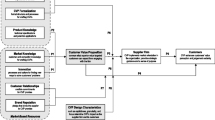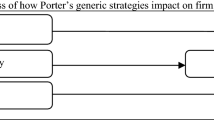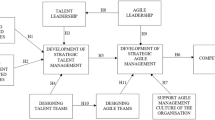Abstract
This study examines the moderating effects of corporate social responsibility (CSR) on the association between market orientation and firm performance in the context of an emerging economy. The results from a sample of firms that operate in Dubai indicate that CSR has a synergistic effect on the impact of market orientation on business performance. The results of our research on the moderating effects of CSR on market orientation subsets reveal that although CSR moderates the association between customer orientation and business performance, it does not moderate the association between competitive orientation and inter-functional coordination and performance. The results of this study are discussed, and implications for practitioners and researchers are presented.
Similar content being viewed by others
References
Aiken, L. and West, S.: 1991, Multiple Regression: Testing and Interpreting Interactions (Newbury Park, CA., Sage).
Albinger, H. and Freeman, S.: 2000, ‘Corporate Social Performance and Attractiveness as an Employer to Different Job Seeking Populations’, Journal of Business Ethics 28, 243-253.
Anderson, D.: 1982, ‘The Satisfied Consumer: Service Return Behavior in the Hospital Obstetrics Market’, Journal of Health Care Marketing 2(4), 25-33.
Anwar, S. and Sohail, M.: 2003, ‘Testing Market Orientation of Bank Managers in the Emerging Economy of Brunei’, International Journal of Bank Marketing 21(6/7), 289-295.
Armstrong, J. and Overton, T.: 1977, ‘August. Estimating Nonresponse Bias in Mail Surveys.’, Journal of Marketing Research 14, 396–402.
Backhaus, K., Stone, B. et al.: 2002, ‘Exploring the Relationship between Corporate Social Performance and Employer Attractiveness’, Business & Society 41(3), 292-319.
Bagozzi, R. and Lynn, W.: 1982, ‘Representing and Testing Organizational Theories: A Holistic Construal’, Administrative Science Quarterly 27, 459-489.
Bagozzi, R. and Yi, Y.: 1988, ‘On the Evaluation of Structural Equation Models’, Journal of the Academy of Marketing Science 16(1), 74-94.
Baker, W. and Sinkula, J.: 1999, ‘The Synergistic Effect of Market Orientation and Learning Orientation on Business Performance.’, Journal of the Academy of Marketing Science 27(4), 411-427.
Barney, J.: 1991, ‘Firm Resources and Sustained Competitive Advantage’, Journal of Management 17, 99-120.
Barone, M., Norman, A. et al.: 2007, ‘Consumer Response to Retailer use of Cause-Related Marketing: Is More Fit Better?’, Journal of Retailing 83, 437-445.
Bentler, P.: 1990, ‘Comparative Fit Indexes in Structural Equation Modeling.’, Psychological Bulletin 107, 238–246.
Bhattacharya, C. B. and Sen, S.: 2003, ‘Consumer–Company Identification: A Framework for Understanding Consumers’ Relationships with Companies’, Journal of Marketing 67(2), 76-88.
Bhattacharya, C. and Sen, S.: 2004, ‘Doing Better at Doing Good: When, Why, and How Consumers Respond to Corporate Social Initiatives’, California Management Review 47(1), 9-24.
Black, A. and Boal, B.: 1994, ‘Strategic Resources: Traits, Configurations and Paths to Sustainable Competitive Advantage’, Strategic Management Journal 15, 131-148.
Bollen, K.: 1989, Structural Equations with Latent Variables. (New York, Wiley & Sons).
Budhwar, P. and Mellahi, K.: 2007, ‘Introduction: Human Resource Management in the Middle East’, International Journal of Human Resource Management 18(1), 2-10.
Cano, R., Carrillat, F. et al.: 2004, ‘A Meta-Analysis of the Relationship between Market Orientation and Business Performance: Evidence from Five Continents’, International Journal of Research in Marketing 21(2), 179-200.
Cohen, J. and Cohen, P.: 1983, Applied Multiple Regression/Correlation Analysis for the Behavior Sciences (2nd Ed.) (Hillsdale, NJ, Erlbaum).
Cottrill, M.: 1990, ‘Corporate Social Responsibility and the Marketplace’, Journal of Business Ethics 9(9), 723-729.
Day, G.: 1994, ‘The Capabilities of Market-Driven Organizations’, Journal of Marketing 58, 37-52.
Day, G. and Nedungadi, P.: 1994, ‘Managerial Representations of Competitive Advantage’, Journal of Marketing 58(2), 31-44.
Delaney, J. and Huselid, M.: 1996, ‘The Impact of Human Resource Management Practices on Perceptions of Business performance’, Academy of Management Journal 39(4), 949-969.
Deng, S. and Dart, J.: 1994, ‘Measuring Market Orientation: A Multi-Factor, Multi-Item Approach’, Journal of Marketing Management 10, 725-42.
Deshpandé, R. and Farley, J.: 1998, ‘Measuring Market Orientation: Generalization and Synthesis’, Journal of Market-Focused Management 2(1), 213–32.
Deshpandé, R., Farley, J. et al.: 1993, ‘Corporate Culture, Customer Orientation, and Innovativeness in Japanese Firms: A Quadrad Analysis’, Journal of Marketing 57(1), 23-27.
Donavan, D., Brown, T. et al.: 2004, ‘Internal Benefits of Service-Worker Customer Orientation: Job Satisfaction, Commitment, and Organizational Citizenship Behaviors’, Journal of Marketing 68(1), 128-146.
Drawbaugh, K.: 2001, Brands in the Balance - Meeting the Challenges of Commercial Identity. (Edinbury Gate, Pearson Education Limited).
Du, S., Bhattacharya, C. et al.: 2007, ‘Reaping Relational Rewards from Corporate Social Responsibility: The Role of Competitive Positioning’, International Journal of Research in Marketing 24, 224-241.
Dwairi, M., Bhuian, S. et al.: 2007, ‘Revisiting the Pioneering Market Orientation Model in an Emerging Economy’, European Journal of Marketing 41(7/8), 713-721.
Ellinger, A., Ketchen, D. et al.: 2008, ‘Market Orientation, Employee Development Practices, and Performance in Logistics Service Provider Firms’, Industrial Marketing Management 37(4), 353-366.
Fombrun, C., Gardberg, N. et al.: 2000, ‘The Reputation Quotient: A Multi-Stakeholder Measure of Corporate Reputation’, Journal of Brand Management 7(4), 241-256.
Foo, L.: 2007, ‘Stakeholder Engagement in Emerging Economies: Considering the Strategic Benefits of Stakeholder Management in a Cross-Cultural and Geopolitical Context’, Corporate Governance 7(4), 379-387.
Fornell, C. and Larcker, D.: 1981, ‘Evaluating Structural Equation Models with Unobservable Variables and Measurement Errors’, Journal of Marketing Research 18, 39–50.
Forstlenlechner, I. and K. Mellahi: 2011, ‘Legitimatization and Employment of Locals by Multinationals’, Journal of World Business (forthcoming).
Greening, D. and Turban, D.: 2000, ‘Corporate Social Performance as a Competitive Advantage in Attracting a Quality Workforce’, Business & Society 39(3), 254-280.
Grinstein, A.: 2008, ‘The Effect of Market Orientation and its Components on Innovation Consequences: A Meta-Analysis’, Journal of the Academy of Marketing Science 36(2), 166-173.
Hair, J., Anderson, R., Tatham, R. et al.: 1998, Multivariate Data Analysis 5th Ed (Upper Saddle River, Prentice Hall).
Han, J., Kim, N. et al.: 1998, ‘Market Orientation and Business Performance: Is Innovation a Missing Link?’, Journal of Marketing 62, 30-45.
Hu, L. and Bentler, P.: 1999, ‘Cutoff Criteria for Fit Indexes in Covariance Structure Analysis: Conventional Criteria Versus New Alternatives.’, Structural Equation Modeling 6(1), 1–55.
Hult, G., Ketchen, D. et al.: 2005, ‘Market Orientation and Performance: An Integration of Disparate Approaches’, Strategic Management Journal 26(12), 1173-1181.
Hunt, S. and Morgan, R.: 1995, ‘The Resource-Advantage Theory of Competition: Dynamics, Path Dependencies, and Evolutionary Dimensions’, Journal of Marketing 60(4), 107-114.
Husted, B. and Allen, D.: 2007, ‘Strategic Corporate Social Responsibility and Value Creation among Large Firms Lessons from the Spanish Experience’, Long Range Planning 40(6), 594-610.
Im, S. and Workman, J.: 2004, ‘Market Orientation, Creativity, and New Product Performance in High-Technology Firms’, Journal of Marketing 68(2), 114-132.
Jaworski, B. and Kohli, A.: 1993, ‘Market Orientation: Antecedents and Consequences’, Journal of Marketing 57, 53-70.
Jaworski, J. and Kohli, A.: 1996, ‘Market Orientation: Review, Refinement, and Roadmap’, Journal of Market-Focused Management 1(2), 119–35.
Kirca, A., Jayachandran, S. et al.: 2005, ‘Market Orientation: A Meta-Analytic Review and Assessment of its Antecedents and Impact on Performance’, Journal of Marketing 69(2), 24-41.
Klein, N.: 1999, No Logo: Taking Aim at the Brand Bullies (New York, Picador).
Kohli, A. and Jaworski, B.: 1990, ‘Market Orientation: The Construct, Research Propositions and Managerial Implications’, Journal of Marketing 54(1), 1-18.
Kolk, A.: 2003, ‘Trends in Sustainability Reporting by the Fortune Global 250’, Business Strategy and the Environment 12(5), 279-291.
Kuada, J. and Buatsi, S.: 2005, ‘Market Orientation and Management Practices in Ghanaian Firms: Revisiting the Jaworski and Kohli Framework’, Journal of International Marketing 13(1), 58-88.
Liao, H. and Subramony, M.: 2008, ‘Employee Customer Orientation in Manufacturing Oranizations: Joint Influences of Customer Proximity and the Senior Leadership Team’, Journal of Applied Psychology 93(2), 317-328.
Liu, H.: 1995, ‘Market Orientation and Firm Size: An Empirical Examination in UK Firms’, European Journal of Marketing 29(1), 57-71.
Maignan, I. and Ferrell, O.: 2004, ‘Corporate Social Responsibility and Marketing: An Integrative Framework’, Academy of Marketing Science 32(1), 3-19.
Maignan, I., Ferrell, O. et al.: 1999, ‘Corporate Citizenship: Cultural Antecedents and Business Benefits’, Journal of the Academy of Marketing Science 27(4), 455-469.
Margolis, J. and Walsh, J.: 2001, People and Profits? The Search for a Link between Company’s Social and Financial Performance (New Jersey, Mahwah).
Margolis, J. and Walsh, J.: 2003, ‘Misery Loves Companies: Rethinking Social Initiatives by Business’, Administrative Science Quarterly 48, 268-305.
Mason, C. and Perreault, W.: 1991, ‘Collinearity, Power, and Interpretation of Multiple Regression Analysis.’, Journal of Marketing Research 28, 268-280.
Matsuno, K. and Mentzer, J.: 2000, ‘The Effects of Strategy Type on the Market Orientation – Performance Relationship’, Journal of Marketing 64, 1-16.
Matsuno, K., Mentzer, J. et al.: 2002, ‘The Effects of Entrepreneurial Proclivity and Market Orientation on Business Performance.’, Journal of Marketing 66, 18 − 32.
McKitterick, J.: 1958, ‘What is the Marketing Management Concept’, in F. Bass (ed.), The Frontiers of Marketing Thought and Science (Chicago, IL, American Marketing Association).
McWilliams, A. and Siegel, D.: 2000, ‘Corporate Social Responsibility and Financial Performance: Correlation Or Misspecification?’, Strategic Management Journal 21(5), 603-609.
McWilliams, A., Siegel, D.: 2001, ‘Corporate Social Responsibility: A Theory of the Firm Perspective’, Academy of Management Review 26(1), 117-127.
Mellahi, K., Morrell, K. and Wood, G.: 2009, The Ethical Business: Challenges and Controversies. New York: Palgrave Macmillan.
Mellahi, K. and Wood, G.: 2003, ‘The Role and Potential of Stakeholders in “Hollow Participation”: Conventional Stakeholder Theory and Institutionalist Alternatives’, Business and Society Review 108(2), 183-202.
Moore, G.: 2001, ‘Corporate Social and Financial Performance: An Investigation in the U.K. Supermarket Industry’, Journal of Business Ethics 34, 299-315.
Narver, J. and Slater, S.: 1990, ‘The Effect of a Market Orientation on Business Profitability’, Journal of Marketing 54, 20-35.
Neter, J., Wasserman, W. and Kutner, M. (eds.): 1985, Applied Linear Statistical Models: Regression, Analysis of Variance, and Experimental Design (Homewood IL, Richard D. Irwin).
Olavarrieta, S. and Friedmann, R.: 2008, ‘Market Orientation, Knowledge-Related Resources and Firm Performance’, Journal of Business Research 61(6), 623-630.
Orlitzky, M. and Benjamin, J.D.: 2001, ‘Corporate Social Performance and Firm Risk: A Meta-Analytic Review’, Business & Society 40(4), 369-396.
Orlitzky, M., Schmidt, F. et al.: 2003, ‘Corporate Social and Financial Performance: A Meta-Analysis’, Organization Studies 24(3), 403-441.
Pelham, A.: 2000, ‘Market Orientation and Other Potential Influences on Performance in Small and Medium-Sized Manufacturing Firms’, Journal of Small Business Management 38(1), 48-67.
Peterson, D.: 2004, ‘The Relationship between Perceptions of Corporate Citizenship and Organizational Commitment’, Business and Society 43(3), 296-319.
Ping, R.: 2004, ‘On Assuring Valid Measures for Theoretical Models using Survey Data’, Journal of Business Research 57, 125-141.
Preston, L.: 1978, Research in Corporate Social Performance and Policy. JAI Press, Greenwich CT.
Rettab, B., Ben Brik, A. et al.: 2009, ‘A Study of Management Perceptions of the Impact of Corporate Social Responsibility on Business performance in Emerging Economies: The Case of Dubai’, Journal of Business Ethics, 89(3), 371-390.
Roberts, P. and Dowling, G.: 2002, ‘Corporate Reputation and Sustained Superior Financial Performance’, Strategic Management Journal 23(12), 1077-1093.
Ruekert, R.: 1992, ‘Developing a Market Orientation: An Organizational Strategy Perspective’, International Journal of Research in Marketing 9, 225-245.
Samiee, S. and Roth, K.: 1992, ‘The Influence of Global Marketing Standardization on Performance’, Journal of Marketing 56(2), 1-17.
Sanzo, M., Santos, M. et al.: 2003, ‘The Role of Market Orientation in Business Dyadic Relationships: Testing an Integrator Model’, Journal of Marketing Management 19(1-2), 73-107.
Sen, S., Bhattacharya, C. et al.: 2006, ‘The Role of Corporate Social Responsibility in Strengthening Multiple Stakeholder Relationships’, Journal of the Academy of Marketing Science 34(2), 158-166.
Sirmon, D., Gove, S. et al.: 2008, ‘Resource Management in Dyadic Competitive Rivalry: The Effects of Resource Bundling and Deployment’, Academy of Management Journal 51(5), 919-935.
Sirmon, D., Hitt, M. et al.: 2007, ‘Managing Firm Resources in Dynamic Environments to Create Value: Looking Inside the Black Box’, The Academy of Management Review 32(1), 273-292.
Siu, W.: 1993, ‘Machiavellianism and Bankers in Hong Kong: Some Results of a Pilot Study’, Journal of Professional Services Marketing 10(1), 201-208.
Slater, S. and Narver, J.: 1994, ‘Does Competitive Environment Moderate the Market Orientation Performance Relationship?’, Journal of Marketing 58, 46-55.
Slater, S., Olson, E. et al.: 2006, ‘The Moderating Influence of Strategic Orientation on the Strategy Formation Capability-Performance Relationship’, Strategic Management Journal 27(12), 1221-1231.
Song, M. and Montoya-Weiss, M.: 2001, ‘The Effect of Perceived Technological Uncertainty on Japanese New Product Development’, Academy of Management Journal 44(1), 61-80.
Stanwick, P. and Stanwick, S.: 1998, ‘The Relationship between Corporate Social Performance and Organizational Size, Financial Performance and Environmental Performance: An Empirical Examination.’, Journal of Business Ethics 17(2), 195-204.
Svensson, G.: 2001, ‘“Globalization” of Business Activities: A “Global Strategy” Approach’, Management Decision 39(1), 6-18.
Teece, D., Pisano, G. et al.: 1997, ‘Dynamic Capabilities and Strategic Management’, Strategic Management Journal 18(7), 509-533.
Theoharakis, V. and Hooley, G.: 2008, ‘Customer Orientation and Innovativeness: Differing Roles in New and Old Europe’, International Journal of Research in Marketing 25(1), 69-79.
Turban, D. and Greening, D.: 1997, ‘Corporate Social Performance and Organizational Attractiveness to Prospective Employees’, Academy of Management Journal 40(3), 658-672.
Vogel, D.: 2005, The Market for Virtue: The Potential and Limits of Corporate Social Responsibility. Washington, DC: Brookings Institution Press.
Webb, D., Mohr, L. et al.: 2007, ‘A Re-Examination of Socially Responsible Consumption and its Measurement’, Journal of Business Research 61, 91-98.
Wei, L. and Lau, C.: 2008, ‘The Impact of Market Orientation and Strategic HRM on Firm Performance: The Case of Chinese Enterprises’, Journal of International Business Studies 39, 980–995.
Weigelt, K. and Camerer, C.: 1988, ‘Reputation and Corporate Strategy: A Review of Recent Theory and Applications’, Strategic Management Journal 9(5), 443–454.
Wright, P. and Ferris, S.: 1997, ‘Agency Conflict and Corporate Strategy: The Effect of Divestment on Corporate Value’, Strategic Management Journal 18, 77-83.
Zhou, K., Li, J. et al.: 2008, ‘Market Orientation, Job Satisfaction, Product Quality, and Firm Performance: Evidence from China’, Strategic Management Journal 29, 985–1000.
Author information
Authors and Affiliations
Corresponding author
Rights and permissions
About this article
Cite this article
Ben Brik, A., Rettab, B. & Mellahi, K. Market Orientation, Corporate Social Responsibility, and Business Performance. J Bus Ethics 99, 307–324 (2011). https://doi.org/10.1007/s10551-010-0658-z
Published:
Issue Date:
DOI: https://doi.org/10.1007/s10551-010-0658-z




